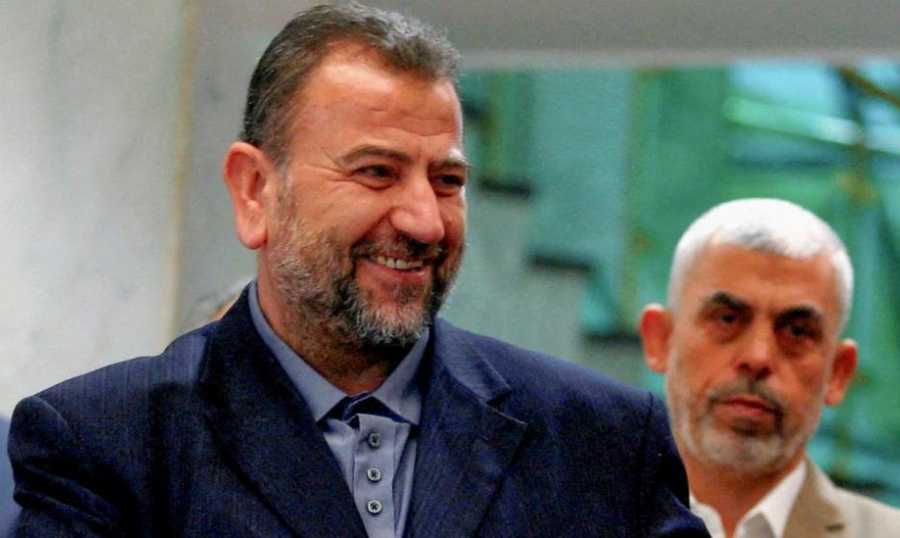Beirut holds its breath after Israel kills al-Arouri
Hamas’s number two was killed yesterday in a Hezbollah stronghold in Beirut. For Hezbollah leader Nasrallah: "This crime will never pass”. Lebanese Prime Minister Nagib Mikati is intensifying contacts to prevent the conflict between Israel and Hamas from spreading to Lebanon. The Israeli army is preparing for “any scenario." On Sunday, Maronite Patriarch al-Rahi called for a halt to hostilities that have been ongoing for weeks at the border.
Beirut (AsiaNews) – Israel has taken a risk of regional escalation by assassinating Hamas' second-in-command, Saleh al-Arouri, 55, a native of Aroura, in the occupied West Bank, and at least six other senior figures in a drone strike in the heart of Beirut on Tuesday.
Saleh al-Arouri, the exiled Hamas leader for the occupied West Bank and co-founder of the al-Qassam Brigades, the armed wing of the Islamist movement, was one of Israel's priority targets.
Settled in Lebanon for several years, he is said to have largely contributed to the rapprochement between Hamas and Hezbollah and to the implementation of the theory of "unity of fronts".
The attack has had a great impact in Lebanon, where the government is doing everything possible to keep the country out of a conflict that could be fatal.
Hamas' second-in-command was the victim of an attack by three Israeli missiles that targeted the second and third floors of a residential building in the Musharafieh neighbourhood in the southern suburbs of Beirut, a Hezbollah stronghold where a Hamas office is located. A third rocket targeted a stationary car below the building.
Hezbollah: “A serious development”
Aware of the risk it had taken, the Jewish state made it known Tuesday evening, through Mark Regev, an adviser to Benjamin Netanyahu, that its “surgical strike” “was not an attack on the Lebanese state. It was not an attack even on Hezbollah”.
But will Hassan Nasrallah, who is due to speak today to commemorate the assassination of Qassem Suleimani (3 January 2020 in Iraq) see it that way?
Certainly, opening a second front in southern Lebanon is a scenario that the United States is seeking to prevent by every means, and Hezbollah has made it clear in recent months that it does not want a full-scale conflict with Israel, but can it remain passive after Israel has moved the fight to its stronghold?
In any case, Hezbollah issued a warning on Tuesday evening that it considers Arouri's assassination not only “a serious assault on Lebanon,” but also “a dangerous development in the course of the war between the enemy and the axis of resistance,” adding that “this crime will never pass without response and punishment".
Mikati and Macron
For his part, Lebanese Prime Minister Najib Mikati accused Israel of trying “to usher Lebanon into a new phase of confrontations”, instructing the Lebanese Foreign Ministry to “submit an urgent complaint to the Security Council”.
“This explosion undoubtedly aims to implicate Lebanon, serving as a clear response to our efforts to keep the spectre of the ongoing war in Gaza away from Lebanon,” the prime minister said. “We appeal to the concerned nations to pressure Israel to halt its targeting.”
For his part, French President Emmanuel Macron called on Israel to "avoid any escalatory attitude, particularly in Lebanon" during a phone conversation with Israeli Minister Benny Gantz, a member of Israel's war cabinet.
Last Sunday, the head of the Maronite Church, Patriarch Bechara Boutros al-Rahi, once again pleaded for an end to hostilities on the Israeli-Lebanese border, where a so-called "medium-intensity" conflict pits Israel against Hezbollah.
Haniyeh: “Expansion” of the war
A movement "whose leaders fall as martyrs for the dignity of our people and our nation will never be defeated,” said Hamas Chief Ismail Haniyeh who slammed the “violation of Lebanon's sovereignty, and an expansion of its circle of aggression" from Gaza.
Meanwhile, the Israeli Defence Forces (IDF) are preparing for "any scenario", said IDF spokesman Rear Adm Daniel Hagari on Wednesday, cited by AFP.
Israeli forces are at a “very high level of readiness – in all arenas, in defence and offence,” Hagari explained. “We are in a high state of readiness for any scenario,” he added. “The most important thing to say tonight is that we are focused and remain focused on fighting Hamas”.
18/05/2021 18:45
24/06/2022 18:10







.png)










